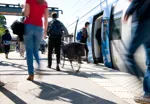The Government Car and Dispatch Agency (GCDA) is facing a major cut in its fleet and budget after the chancellor confirmed ministerial cars will be provided only in exceptional circumstances.
The GCDA provides the drivers and cars – mainly Toyota Prius and Jaguar XJ models - to ferry ministers and senior civil servants around.
However, last week the new coalition government said it will significantly cut the GCDA’s budget and force ministers to walk or take public transport wherever possible.
“We will seek to make savings of at least a third in the cost of the government car service,” said the chief secretary to the Treasury, David Laws.
“In the future, no minister should have a dedicated car or driver other than in exceptional circumstances.
“Ministers will be expected to walk or take public transport where possible, or use a pooled car. The pooling of cars will allow big savings to be made.”
The pool car fleet is based in Westminster and is available at short notice to ministers and officials. These cars come with trained and security cleared drivers.
The decision means about 80 cars should be taken from the current fleet of 250 vehicles.
The cars typically cover 30,000 miles a year, which is also expected to be reduced significantly.
The Government ministerial car service budget for this year was originally set at £8.3m, but will now be slashed to £5.54m.
“Limiting the ministerial entitlement to a dedicated car and driver will save at least one-third from the cost of the Government Car Service,” confirmed a GCDA spokesman, who added that “it is too early to say” what the cuts will mean in practical terms.
“Each minister - apart from the very limited number whose responsibilities mean they need a fully-protected service - will need to decide if there is sufficient justification for them to have an allocated car or whether their requirements can be met from the pool system.
“All ministers are currently considering the new arrangements before making a decision.”
The uncertainty over what the practical implications are from the budget cut stems from reports that ministers must still send their official documents by car.
So ministers have been told to travel by second-class public transport, but for security reasons their documents must travel separately.
However, while some reports suggest this means sending a separate ministerial car for the documents, the GCDA provides a secure nationwide courier service for exactly this scenario.
The question over whether ministers should have chauffeur driven cars has been rumbling for years.
Chris Mullin wrote in his published diaries that when he became a minister in 1999: "I am entitled to a car and a driver. Entirely pointless since the 159 and 3 buses will continue to run past my door, even though I am a minister.”
For best practice and legal advice, have a look at the fleet news legal section for more information.















Login to comment
Comments
No comments have been made yet.